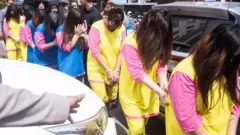Image source, BETWEEN PHOTOS
The police arrested the six people they accused of being involved in a baby's sales syndicate under the guise of adoption. In the operation of the apparatus, the departure of two babies to Singapore is said to be prevented.
The two five months old and 10 months were found by police in Marau, West Kalimantan, along with a suspect with the initials TSH, July 27.
The two babies of the male and female were brought by the suspect while hiding from the police pursuit.
“This baby was carried away as long as the suspect escaped. At first in Pontianak, it was taken to Ketapang, and finally in Marau,” said Director of the West Java Regional Police General Criminal Investigation Director, Senior Commissioner Surawan, in Bandung, Tuesday (29/07).
“When the suspect heard the first perpetrators were arrested, they tried to hide, move with their babies,” Surawan said.
The police then took the two babies to the Sartika Asih Hospital in the city of Bandung, for a health check.
“Furthermore, we might leave it temporarily at the orphanage,” said Surawan, as reported by reporter Yulia Saputra for BBC News Indonesia.
In addition to arresting TSH who was accused of carrying two babies, the police arrested five other suspects, with the initials KR, DI, DA, FL, and ML. They were arrested in different locations, namely in Marau, Pontianak, and Kutubaru, West Kalimantan.
What is the role of the alleged perpetrators and what is related to the baby's trading syndicate?
The six suspects were accused of being part of the baby trading syndicate, 14 of its members had already been arrested in mid -July.
According to the police claim, the role of the six suspects, all of whom were diverse. There is a caregiver to become a fake mother in the process of adoption in Singapore, said Surawan.

Image source, Between Photos/Novrian Arbi
Of the six suspects, the police only brought four suspects in the West Java Mapolda detention.
“Two more suspects were not detained because their condition was pregnant. They were required to report to the West Kalimantan Regional Police,” Surawan said.
The police are still pursuing two other suspects who are included in the People's Search List (DPO), namely Wiwit who was accused of playing the role of an intermediary and Yuyun Yuningsih alias Mama Yuyun who was accused of playing the role of a baby recruiter.
How many babies are prevented from leaving for Singapore?
On July 14, police found six babies, who were on average one year old. The number of saved babies increased by two people on July 27.
In total there are eight babies called the police they can prevent sold to buyers.
The suspects, said Surawan, said that at least had sold 25 babies to a number of regions in Indonesia. Of that number, 15 babies aged between 5-14 months have been sent to Singapore under the pretext of adoption, Surawan's claim.
The police have not been sure whether the last two babies they found were included in babies from West Java who were recruited by AF suspects.
“We do a backward examination with other suspects to be able to get further information about the origin of this baby,” said Surawan.
Where are the parents of the baby traded?
The existence of 25 baby parents who are traded are still mystery. The police made a new claim to get information from one baby's parents who first reported a case of kidnapping their children. This report was the beginning of the disclosure of this baby trading syndicate.
Director of the West Java Regional Police General Criminal Investigation, Police Commissioner Surawan, said that his party was difficult to trace the existence of baby parents because the suspect was a baby recruiter, AF, “Not Cooperative”.
Surawan made a claim to have confiscated AF's Facebook account, which was allegedly used to connect with parents who intend to give their children to be adopted.
“Later from Facebook, hopefully we will get the identity of the mothers of the babies. Later we will conduct a Facebook account examination. Now we have seized,” said Surawan.
How did adoption transactions occur?
Kombes Surawan said that the adoption of baby adoption occurred in Singapore between agents in Indonesia, named Popo, and agents in Singapore. He said, the disbursement of money occurred after Popo sent a baby to Singapore.

Image source, Between Photos/Novrian Arbi/Tom.
Popo, said Surawan, is a 69 -year -old elderly woman who is a recidivist similar case in North Jakarta.
“Baby he offers via video call. If the one in Singapore is okay, then the baby is dispatched by the baby to Pontianak to the manufacturing of documents. Then sent to Singapore, “said Surawan.
“If the information from Popo, his agency has been connected to the agency there. We are checking the agency there officially or not,” Surawan said.
What is the next police doing?
The police are still pursuing two other suspects who are included in the People's Search List (DPO).
The police promised to explore and develop this case, including tracing a network of baby trading syndicates in Singapore.
The police also said they would study various documents they confiscated from Popo's house, including baby passports, fake parents passports, and adoption deeds from notaries.
“We are still studying the documents we got, especially the notary deed that we got from the search,” Surawan said.
“There are 12 deeds that we found, it is a deed of adoption of these babies. We also get the perpetrators' accounts that we will learn,” Surawan explained.
In an English -language adoption deed made by a notary in Pontianak, Surawan's claim, listed a number of costs, including labor costs, baby care, and fee for the Indonesian agency. The total nominal written on the deed is more than S $ 20,000 or around Rp. 256 million.
“We are studying the adoption system in Singapore. If adoption is not buying and selling. But we check from the act of the act, what is the value of compensation given to the syndicate. At a glance there is a fee for Indonesian agents,” said Surawan
“We see mens bad (evil intentions). By being given compensation, whether including buying and selling or not, “said Surawan.
Reporter Yulia Saputra in Bandung contributed to this article.















